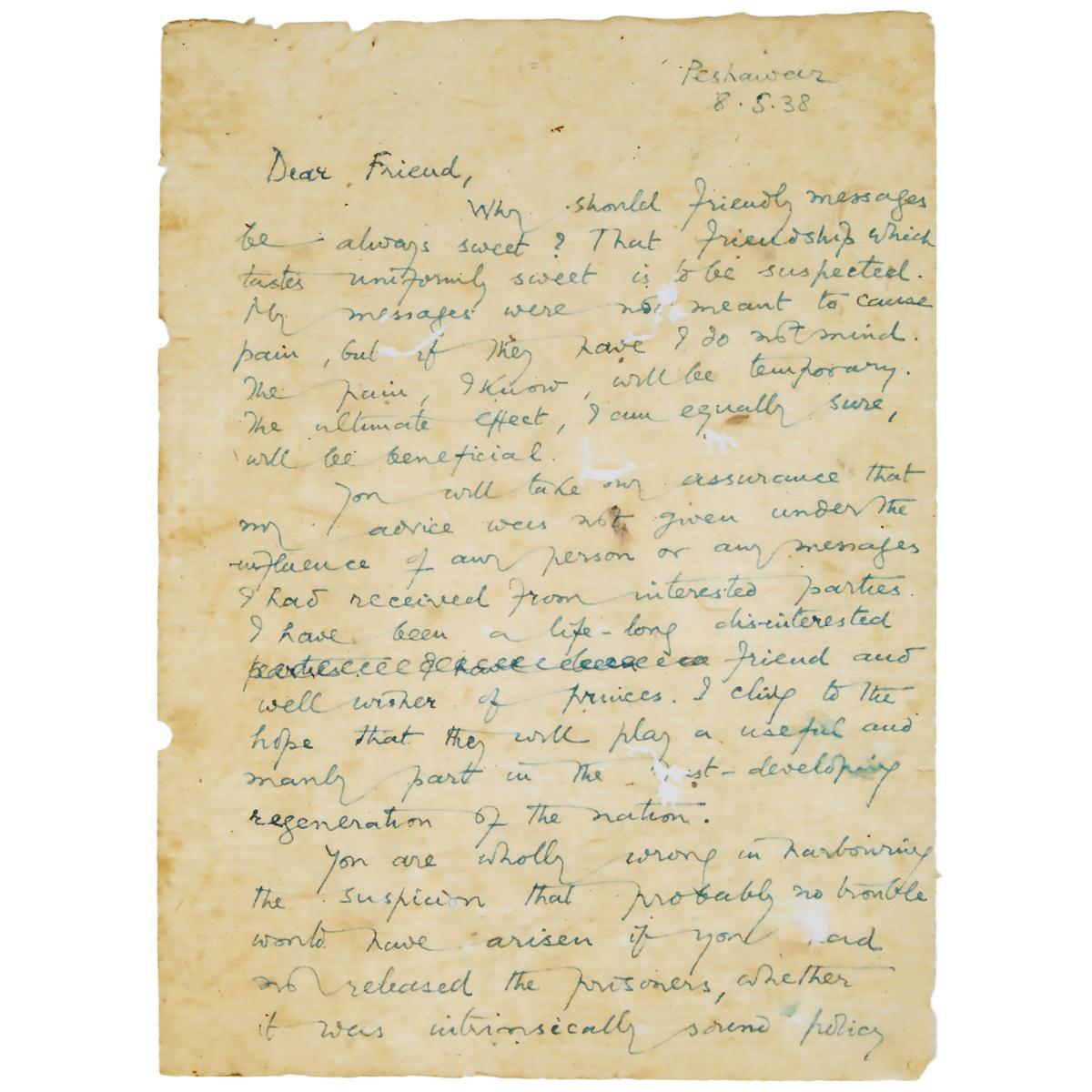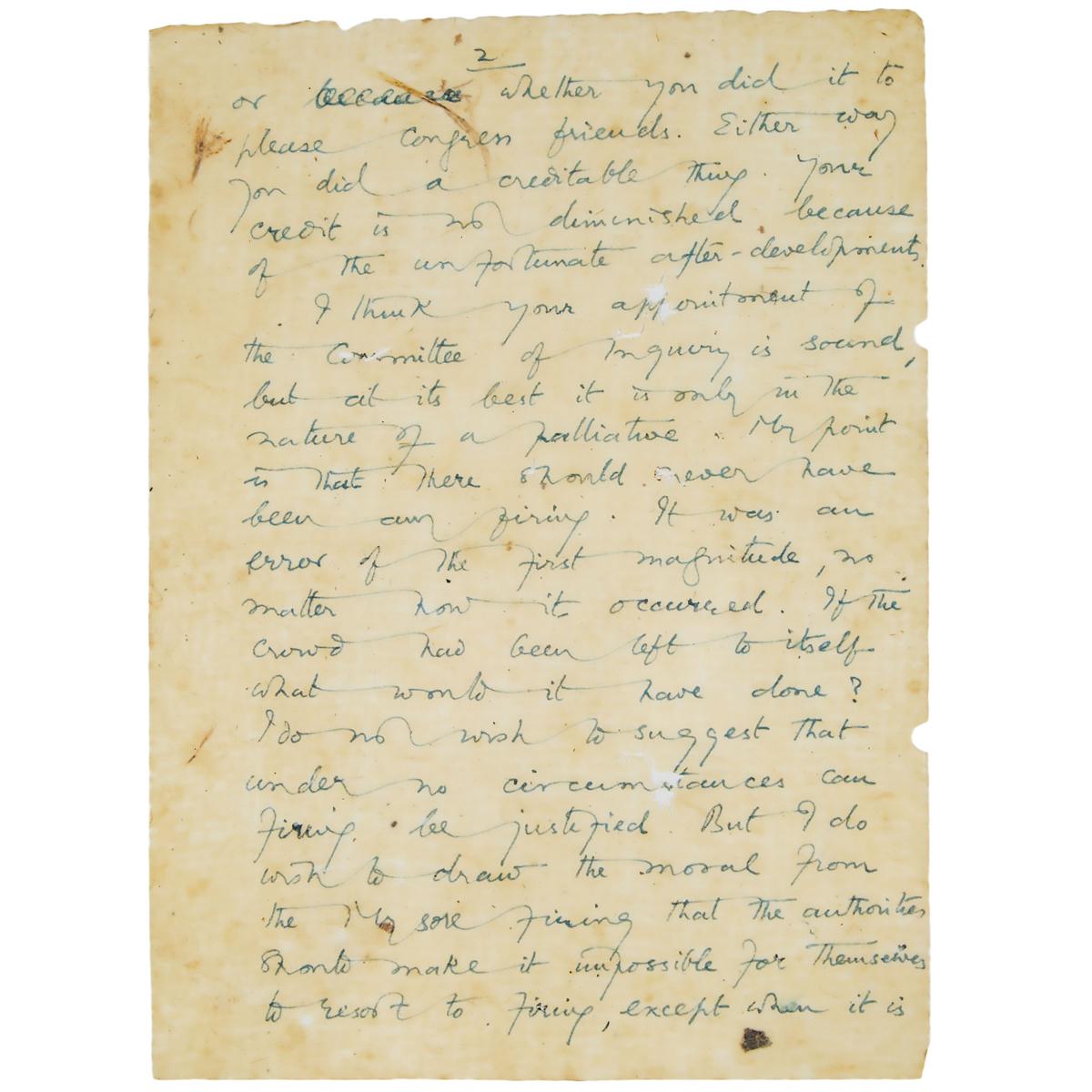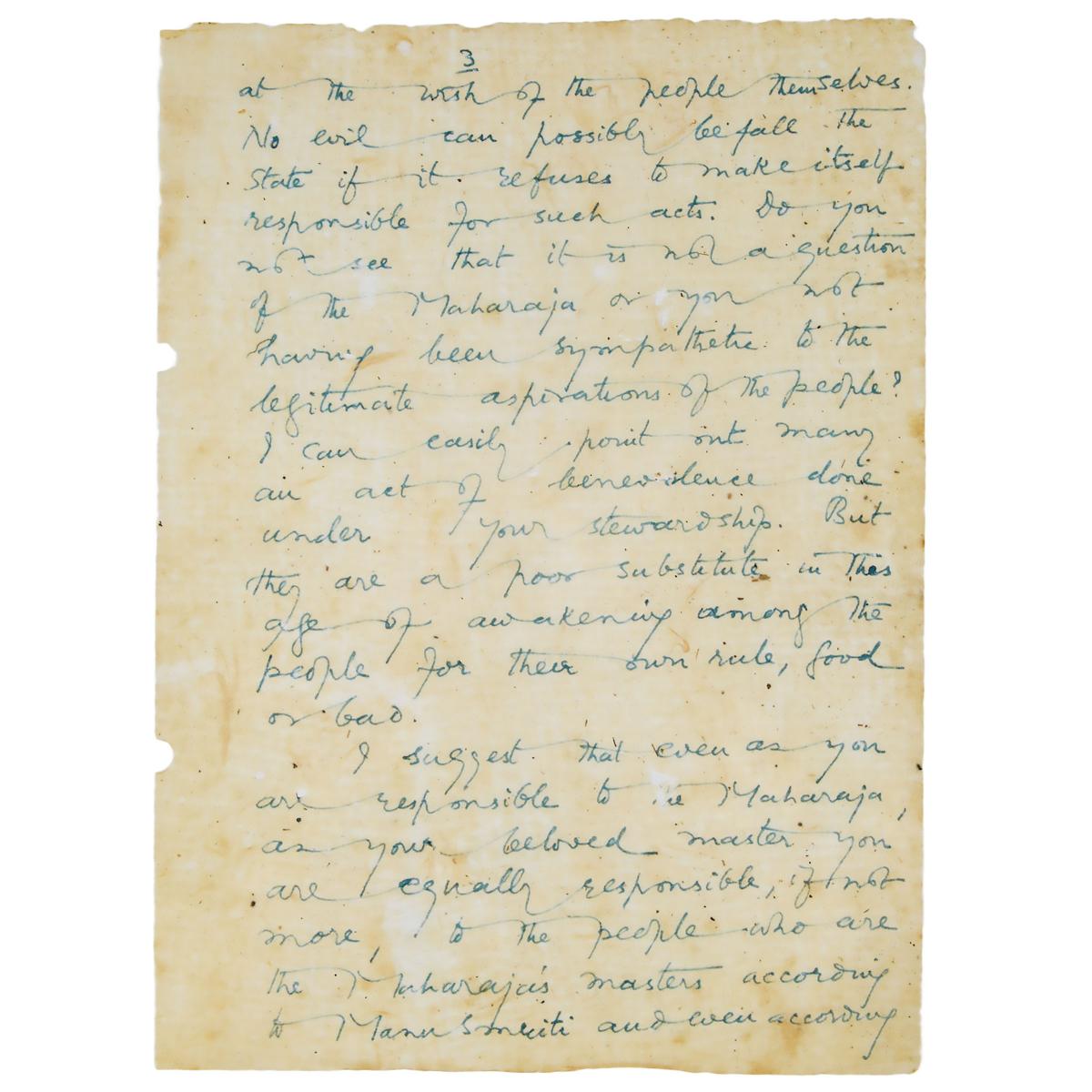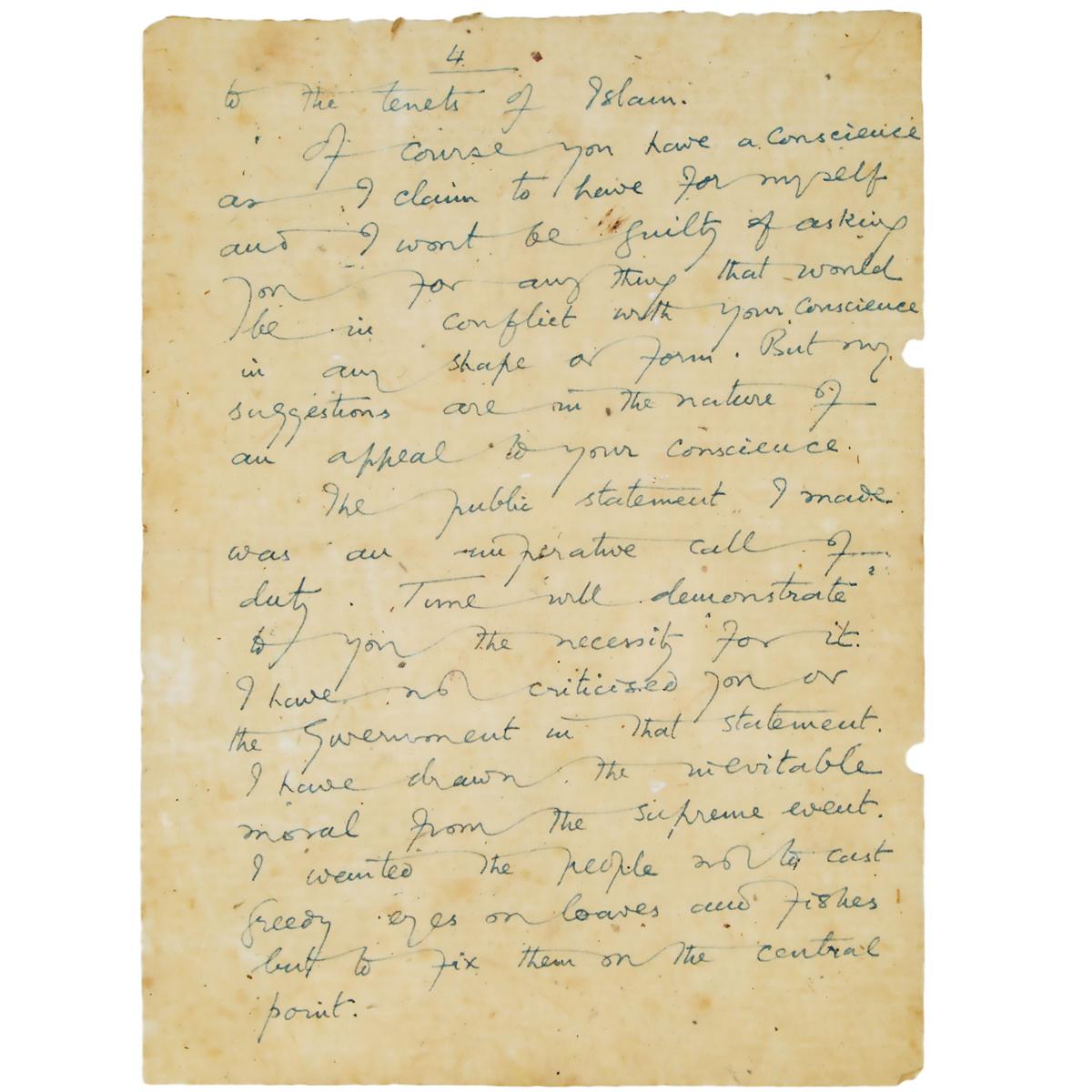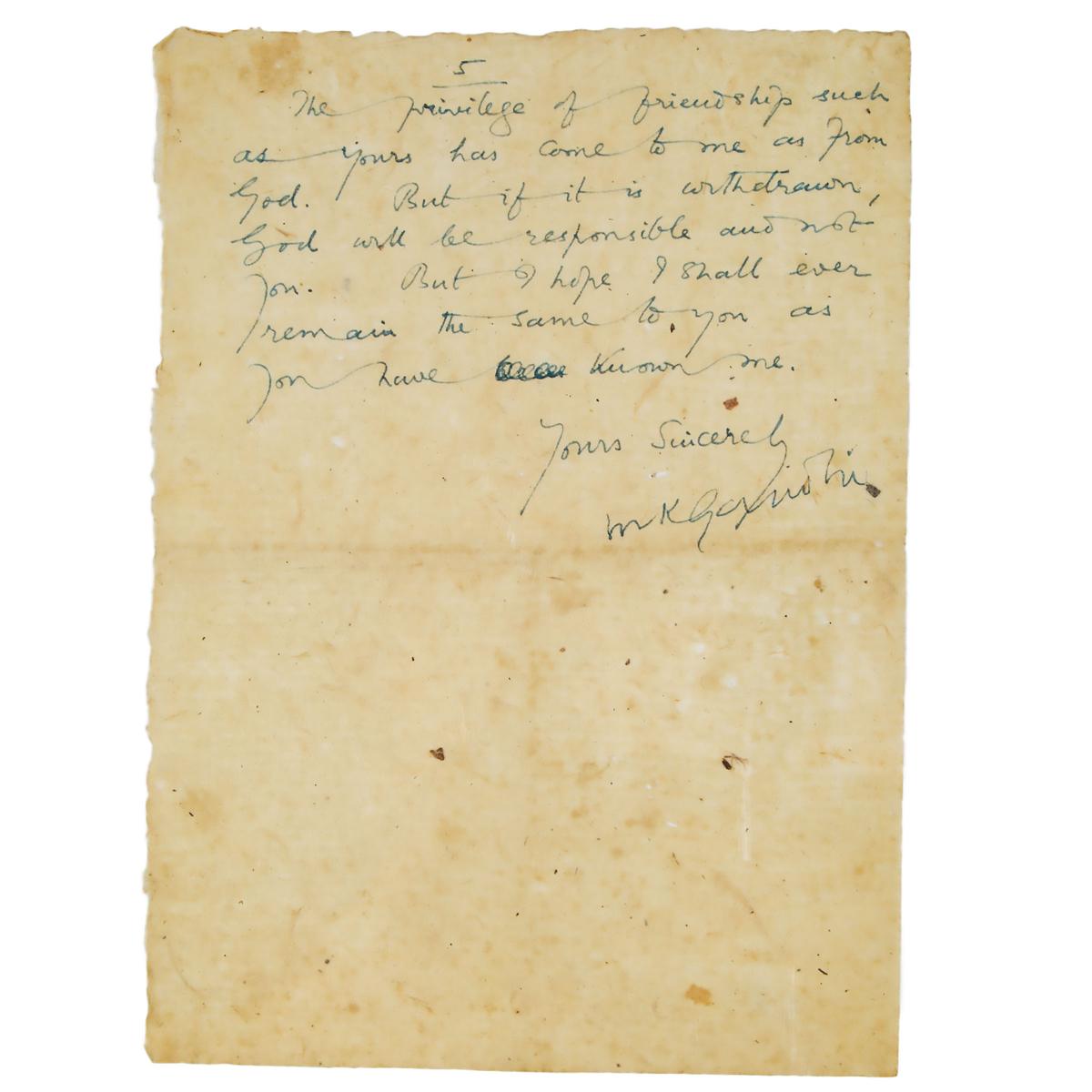1
Mohandas Karamchand Gandhi (Mahatma Gandhi) (1869-1948) Letter Signed, To Diwan Sir Mirza Ismail, Pe
5 pages, written in quill on cotton paper by Mahadev Desai (Gandhi's secretary), 8.25 x 6 in — 21 x 15.2 cm
Provenance:
Private Collection, Canada
Sir Mirza Muhammad Ismail, thence by descent to his son Humayun Mirza
Literature:
Peshawar
8.5.38
Dear Friend,
Why should friendly messages be always sweet? That friendship which tastes uniformly sweet is to be suspected. My messages were no[t] meant to cause pain, but if they have I do not mind. The pain, I know, will be temporary. The ultimate effect, I am equally sure, will be beneficial.
You will take [o]ur assurance that my advice was not given under the influence of any person or any messages I had received from interested parties. I have been a life-long disinterested friend and well wisher of princes. I cling to the hope that they will play a useful and manly part in the [fa]st-developing regeneration of the nation.
You are wholly wrong in harbouring the suspicion that probably no trouble would have arisen if you [h]ad not released the prisoners, whether it was intrinsically sound policy or whether you did it to please Congress friends. Either way you did a creditable thing. Your credit is not diminished because of the unfortunate after-developments.
I think your a[pp]ointment of the Co[m]mittee of Inquiry is sound, but at its best it is only in the nature of a palliative. My point is that there should [n]ever have been any firing. It was an error of the first magnitude, no matter how it occurred. If the crowd had been left to itself what would it have done? I do not wish to suggest that under no circum[st]ances can firing be justified. But I do wish to draw the moral from the Mysore firing that the authorities should make it impossible for themselves to resort to firing, except when it is at the wish of the people themselves. No evil can possibly befall the State if it refuses to make itself responsible for such acts. Do you not see that it is not a question of the Maharaja or you not having been sympathetic to the legitimate aspirations of the people? I can easily point out many an act of benevolence done under your stewardship. But they are a poor substitute in this age of awakening among the people for their own rule, good or bad.
I suggest that even as you ar[e] responsible to [th]e Maharaja, as your beloved master[,] you are equally responsible, if not more, to the people who are the Maharaja's masters according to Manu Smriti and even according o the tenets of Islam.
Of course you have a conscience as I claim to have for myself and I wont be guilty of asking you for any thing that would be in conflict with your conscience in any shape or form. But my suggestions are in the nature of an appeal to your conscience.
The public statement I made was an imperative call of duty. Time will demonstrate to you the necessity for it. I have not criticised you or the Government in that statement. I have drawn the inevitable moral from the supreme event. I wanted the people not to cast greedy eyes on loaves and fishes but to fix them on the central point.
The privilege of friendship such as yours has come to me as from God. But if it is withdrawn, God will be responsible and not you. But I hope I shall ever remain the same to you as you have known me. Yours Sincerely mKGandhi
Note:
The current lot is dated May 8, 1938 and was dictated by Gandhi to Mahadev Desai, another important figure in Indian’s freedom movement, who served as Gandhi’s secretary. It expresses Gandhi’s personal thoughts about a tragic, seminal moment in India’s struggle for independence from British colonialism. Addressed to Sir Mirza Ismail, who served as the Diwan or Prime Minister of the princely state of Mysore from 1926 to 1941, its contents concern the murder of 32 men and women slaughtered at a peaceful protest (a Satyagraha) in the village of Viduraswatha in the princely state of Mysore in which authorities opened fire on the men and women as they raised the Congress flag (which became the National Flag of India) resulting in these deaths, and wounding of many others. Vinay Lal, Professor of Indian History at ULCA and a scholar of Gandhi’s life, works and thought for over 35 years states “[In this letter] Gandhi can be seen admonishing the Prime Minister that even though he is loyal to the maharaja (ruler), he is bound by canons of both Hindu law and Islamic law to be loyal to the subjects of the ruler and mindful of the liberties they deserve,”. He also states, “It is a near miracle that a letter such as this one is still in private hands.” “The letter’s content directly involves three key personalities involved in India’s struggle for independence from British Imperialism: Mohandas Karamchand Gandhi (Mahatma Gandhi), Diwan Sir Mirza Ismail, and Mahadev Desai (Gandhi’s secretary, who was an extremely important figure in this effort in his own right,” said Sean Quinn, senior specialist at Waddington’s. “That the letter is previously undocumented and unpublished ’source’ material makes it very significant in the world of Gandhi historians, and that it is written on handmade paper reinforces Gandhi’s mantra ‘we will make it ourselves’, shunning Imperialist products.
Estimate: $10,000—15,000
5 pages, written in quill on cotton paper by Mahadev Desai (Gandhi's secretary), 8.25 x 6 in — 21 x 15.2 cm
Provenance:
Private Collection, Canada
Sir Mirza Muhammad Ismail, thence by descent to his son Humayun Mirza
Literature:
Peshawar
8.5.38
Dear Friend,
Why should friendly messages be always sweet? That friendship which tastes uniformly sweet is to be suspected. My messages were no[t] meant to cause pain, but if they have I do not mind. The pain, I know, will be temporary. The ultimate effect, I am equally sure, will be beneficial.
You will take [o]ur assurance that my advice was not given under the influence of any person or any messages I had received from interested parties. I have been a life-long disinterested friend and well wisher of princes. I cling to the hope that they will play a useful and manly part in the [fa]st-developing regeneration of the nation.
You are wholly wrong in harbouring the suspicion that probably no trouble would have arisen if you [h]ad not released the prisoners, whether it was intrinsically sound policy or whether you did it to please Congress friends. Either way you did a creditable thing. Your credit is not diminished because of the unfortunate after-developments.
I think your a[pp]ointment of the Co[m]mittee of Inquiry is sound, but at its best it is only in the nature of a palliative. My point is that there should [n]ever have been any firing. It was an error of the first magnitude, no matter how it occurred. If the crowd had been left to itself what would it have done? I do not wish to suggest that under no circum[st]ances can firing be justified. But I do wish to draw the moral from the Mysore firing that the authorities should make it impossible for themselves to resort to firing, except when it is at the wish of the people themselves. No evil can possibly befall the State if it refuses to make itself responsible for such acts. Do you not see that it is not a question of the Maharaja or you not having been sympathetic to the legitimate aspirations of the people? I can easily point out many an act of benevolence done under your stewardship. But they are a poor substitute in this age of awakening among the people for their own rule, good or bad.
I suggest that even as you ar[e] responsible to [th]e Maharaja, as your beloved master[,] you are equally responsible, if not more, to the people who are the Maharaja's masters according to Manu Smriti and even according o the tenets of Islam.
Of course you have a conscience as I claim to have for myself and I wont be guilty of asking you for any thing that would be in conflict with your conscience in any shape or form. But my suggestions are in the nature of an appeal to your conscience.
The public statement I made was an imperative call of duty. Time will demonstrate to you the necessity for it. I have not criticised you or the Government in that statement. I have drawn the inevitable moral from the supreme event. I wanted the people not to cast greedy eyes on loaves and fishes but to fix them on the central point.
The privilege of friendship such as yours has come to me as from God. But if it is withdrawn, God will be responsible and not you. But I hope I shall ever remain the same to you as you have known me. Yours Sincerely mKGandhi
Note:
The current lot is dated May 8, 1938 and was dictated by Gandhi to Mahadev Desai, another important figure in Indian’s freedom movement, who served as Gandhi’s secretary. It expresses Gandhi’s personal thoughts about a tragic, seminal moment in India’s struggle for independence from British colonialism. Addressed to Sir Mirza Ismail, who served as the Diwan or Prime Minister of the princely state of Mysore from 1926 to 1941, its contents concern the murder of 32 men and women slaughtered at a peaceful protest (a Satyagraha) in the village of Viduraswatha in the princely state of Mysore in which authorities opened fire on the men and women as they raised the Congress flag (which became the National Flag of India) resulting in these deaths, and wounding of many others. Vinay Lal, Professor of Indian History at ULCA and a scholar of Gandhi’s life, works and thought for over 35 years states “[In this letter] Gandhi can be seen admonishing the Prime Minister that even though he is loyal to the maharaja (ruler), he is bound by canons of both Hindu law and Islamic law to be loyal to the subjects of the ruler and mindful of the liberties they deserve,”. He also states, “It is a near miracle that a letter such as this one is still in private hands.” “The letter’s content directly involves three key personalities involved in India’s struggle for independence from British Imperialism: Mohandas Karamchand Gandhi (Mahatma Gandhi), Diwan Sir Mirza Ismail, and Mahadev Desai (Gandhi’s secretary, who was an extremely important figure in this effort in his own right,” said Sean Quinn, senior specialist at Waddington’s. “That the letter is previously undocumented and unpublished ’source’ material makes it very significant in the world of Gandhi historians, and that it is written on handmade paper reinforces Gandhi’s mantra ‘we will make it ourselves’, shunning Imperialist products.
Estimate: $10,000—15,000
The Cabinet of Curiosities Including World History and Culture
Ends from
Venue Address
For Waddington's delivery information please telephone +1 4165049100.
Important Information
Bidding for this sale will take place entirely online on Waddington's Online Auctions Platform
A buyer's premium of 20% of the successful bid (hammer) price of each lot is paid by the buyer as part of the total purchase price. Payment for purchases is accepted in Canadian dollars by cash, certified cheque drawn on a Canadian bank, travelers cheque, bank draft or transfer, Visa or Mastercard within 10 days from the date of the sale.
CITES
Restrictions exist regarding the import and export of species protected under CITES (Convention on International Trade in Endangered Species). This includes but is not limited to items made of or containing bone (whalebone etc.), ivory, tortoise shell, seal skin, rhinoceros horn and any other animal part and is strictly controlled or forbidden by most countries. Please review your country’s laws before bidding on pieces made of or containing these restricted items. It is the sole responsibility of the buyer to inquire about and obtain the proper permits for artwork purchased that may contain restricted materials, if such permit can be obtained. Please contact the department for further assistance. Failure to obtain necessary import/export permits will not void any sale. For more information please visit www.cites.org
Terms & Conditions
1. All lots are sold “AS IS”. Any description issued by the auctioneer of an article to be sold is subject to variation to be posted or announced verbally in the auction room prior to the time of sale. While the auctioneer has endeavoured not to mislead in the description issued, and the utmost care is taken to ensure the correct cataloguing of each item, such descriptions are purely statements of opinion and are not intended to constitute a representation to the prospective purchasers and no warranty of the correctness of such description is made. An opportunity for inspection of each article is offered prior to the time of sale. No sale will be set aside on account of lack of correspondence of the article with its description or its reproduction, if any, whether colour or black & white. Some lots are of an age and/or nature which preclude their being in pristine condition and some catalogue descriptions make reference to damage and/or restoration. The lack of such a reference does not imply that a lot is free from defects nor does any reference to certain defects imply the absence of others. Frames on artwork are not included as part of purchase or condition. It is the responsibility of prospective purchasers to inspect or have inspected each lot upon which they wish to bid, relying upon their own advisers, and to bid accordingly.
2. Each lot sold is subject to a premium as part of the purchase price as per below:
Live and Online Auctions
(excluding Canadian Fine Art, Inuit Art, The Art of Canada and Fine Wine & Spirits Auctions)
20% - up to and including $50,000
15% - in excess of $50,000
Canadian Fine Art, Inuit Art, The Art of Canada and Fine Wine & Spirits Live and Online Auctions
20%
3. Unless exempted by law, the buyer is required to pay Harmonized Sales Tax on the total purchase price including the buyer’s premium. For international buyers, taxes are not applicable when purchases are shipped out of country. Items shipped out of Ontario, the buyer is required to pay taxes as per the tax status of that province, whether it HST or GST (Goods and Services Tax).
4. The auctioneer reserves the right to withdraw any lot from sale at any time, to divide any lot or to combine any two or more lots at his sole discretion, all without notice.
5. The auctioneer has the right to refuse any bid and to advance the bidding at his absolute discretion. The auctioneer reserves the right not to accept and not to reject any bid. Without limitation, any bid which is not commensurate with the value of the article offered, or which is merely a nominal or fractional advance over the previous bid may not be recognized.
6. Each lot may be subject to an unpublished reserve which may be changed at any time by agreement between the auctioneer and the consignor. The auctioneer may bid, or direct an employee to bid, on behalf of the consignor as agreed between them. In addition, the auctioneer may accept and submit absentee and telephone bids, to be executed by an employee of the auctioneer, pursuant to the instructions of prospective purchasers not in attendance at the sale.
7. The highest bidder accepted by the auctioneer for any lot shall be the buyer and such buyer shall forthwith assume full risk and responsibility for the lot and must comply with such other Conditions of Sale as may be applicable. If any dispute should arise between bidders the auctioneer shall have the absolute discretion to designate the buyer or, at his option, to withdraw any disputed lot from the sale, or to re-offer it at the same or a subsequent sale. The auctioneer’s decision in all cases shall be final.
8. Immediately after the purchase of a lot, the buyer shall pay or undertake to the satisfaction of the auctioneer with respect to payment of the whole or any part of the purchase price requested by the auctioneer, failing which the auctioneer in his sole discretion may cancel the sale, with or without re-offering the item for sale.
9. The buyer shall pay for all lots within 48 hours from the date of the sale, after which a late charge of 2% per month on the total invoice may be incurred or the auctioneer, in his sole discretion, may cancel the sale. The buyer shall not become the owner of the lot until paid for in full. Items must be removed within 10 days from the date of sale , after which storage charges may be incurred.
10. Each lot purchased, unless the sale is cancelled as above, shall be held by the auctioneer at his premises or at a public warehouse at the sole risk of the buyer until fully paid for and taken away.
11. Notwithstanding condition no. 1, if the buyer, prior to removal of a lot, makes arrangements satisfactory to the auctioneer for the inspection of such lot by a fully qualified person acceptable to the auctioneer to determine the genuineness or authenticity of the lot, to be carried out promptly following the sale of the lot, and if, but only if, within a period of 14 days following the sale a written opinion of such person is presented to the auctioneer to the effect that the lot is not genuine or authentic, accompanied by a written request by the buyer for rescission of the sale, then the sale of the lot will be rescinded and the sale price refunded to the buyer.
12. Payment for purchases must be by cash, INTERAC direct debit (Cdn clients in person only), certified cheque (U.S. & Overseas not applicable), travelers cheque, bank draft, electronic transfer (fee applies), and VISA or Mastercard (up to $25,000).
13. In the event of failure to pay for or remove articles within the aforementioned time limit, the auctioneer, without limitation of the rights of the consignor and the auctioneer against the buyer, may resell any of the articles affected, and in such case the original buyer shall be responsible to the auctioneer and the consignor for:
(a) any deficiency in price between the re-sale amount and the amount to have been paid by the original buyer;
(b) any reasonable charge by the auctioneer for the storage of such articles until payment and removal by the subsequent buyer; and
(c) the amount of commission which the auctioneer would have earned had payment been made in full by the original buyer.
14. It is the responsibility of the buyer to make all arrangements for insuring, packing and removing the property purchased and any assistance by the auctioneer or his servants, agents or contractors, in packing or removal shall be rendered as a courtesy and without any liability to them.
15. The auctioneer acts solely as agent for the consignor and makes no representation as to any attribute of, title to, or restriction affecting the articles consigned for sale. Without limitation, the buyer understands that any item bought may be affected by the provisions of the Cultural Property Export Act (Canada).
16. The auctioneer reserves the right to refuse admission to the sale or to refuse to recognize any or all bids from any particular person or persons at any auction.











